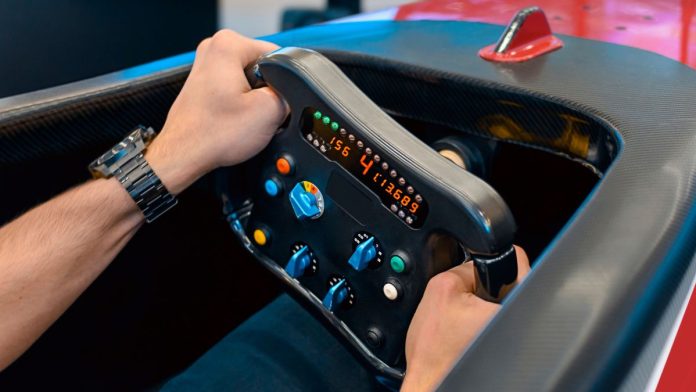Driving simulators are vital to driver preparation, vehicle planning, and street well-being in the always-changing transportation industry. Present-day innovation permits driving simulator frameworks to give a controlled yet practical driving experience, assisting with tackling the present transportation issues.
Driving simulators have several uses, proving their importance in modern society. Driver education and training are their primary responsibilities. New drivers can practice in a safe, risk-free simulator. Simulators may simulate a variety of driving circumstances, including heavy rain, fog, and icy roads, which are impracticable or harmful in real life. This extensive training prepares rookie drivers for real-world driving, improving road safety.
Driving simulators are useful beyond rookie driver training. They help rehabilitate drivers with medical issues that may impair driving. These people can test and enhance their driving skills in simulators without risking their safety. This is crucial in aging populations because simulators can safely assess and manage motor skills, and reaction time decreases.
Driving simulators are essential for car development. Automakers use these technologies to evaluate and improve vehicle dynamics, ergonomics, and control. Thus, safer, more efficient, and more comfortable automobiles can be created. Simulators let designers determine how vehicle parameters affect driver behavior and performance, which is crucial for designing cars that match human capabilities and constraints.
Driving simulators are also used in road safety studies. These instruments help researchers investigate driver behavior in reaction to road conditions, signage, and traffic systems. This research is essential for safer roads and effective traffic laws. Simulators can measure how mobile phones affect driving performance and inform policy decisions.
Driving simulators assist with independent vehicle advancements. They give a stage to testing and ensuring independent driving frameworks in perilous or unfeasible circumstances. These frameworks should be solid, safe, and reasonable for public street reconciliation. Engineers can test independent frameworks in outrageous settings and exceptional circumstances by utilizing simulators to get familiar with their abilities and limits.
Additionally, driving simulators are needed for environmental reasons. Simulators allow researchers to examine and enhance fuel efficiency and emissions without the ecological impact of real-world testing in a climate-conscious world. This helps create greener, more sustainable transportation.
Driving simulators provide psychological and behavioral insights in addition to practical uses. Studies examine driver stress, weariness, and decision-making using them. The information helps design interventions and strategies to improve driver well-being and performance, improving road safety.
However, developing and operating driving simulators takes a lot of work. Advanced technology, human factors skills, and vehicle and road dynamics knowledge are needed to create a realistic and immersive driving experience. In a virtual world, too much control can make the experience unrealistic, while too little might lead to unreliable outcomes.
Driving simulators have limitless possibilities as technology advances. Improved VR, AI, and
More realistic and advanced haptic feedback technologies are emerging. Future advances may improve simulation accuracy and efficacy, allowing more detailed modeling of real-world circumstances and human behavior.
Driving simulators in education are also growing. Driver education programs can be more comprehensive and practical with simulators. This improves driver skills and could drastically reduce road accidents and fatalities.
Driving simulators are applicable in urban planning and public policy. Planning and policymakers can make informed infrastructure, traffic management, and public transportation decisions by modeling traffic patterns and vehicle behavior in various urban layouts. This reduces congestion and improves accessibility, making cities more efficient and safer.
Global awareness of driving simulators is growing. As transportation issues become increasingly complex and regional, simulators offer tailored solutions. They may be tailored to local cultural, environmental, and infrastructural conditions, making them useful worldwide.
Corporations and industries use driving simulators for employee training and appraisal. Simulators help logistics and public transportation workers assess and enhance their driving skills. It improves worker safety, and operations efficiency and reliability.
Driving simulators are being studied for therapeutic purposes. As cognitive and motor rehabilitation aids, they offer a unique environment for injured or neurologically ill drivers to regain their abilities. This simulator application shows their adaptability and potential to improve lives.
Driving simulators have many purposes in training, well-being, innovation, natural science, brain research, and metropolitan preparation; from there, the sky is the limit. They offer a safe, controlled, and adaptable setting for considering and settling transportation issues. As these apparatuses develop, they will shape the fate of transportation by further developing street well-being, productivity, and supportability. Driving simulators continue to develop versatility and security in present-day culture.
Driving simulators may teach vehicle dynamics and mechanics as well as driving abilities. Try different driving approaches, including smooth cornering or efficient gear shifting, to learn how to drive a car.
Racing and high-performance drivers benefit from driving simulators. They allow you to practice racing in many situations and courses without the exorbitant costs and risks of real racing.
Driving simulators are also used professionally. They train public transportation, logistics, and emergency service drivers. Simulators can be utilized for initial training and continuing skill improvement in several domains to prepare drivers for their driving settings.









